Nudges, Norms, or Just Contagion? A Theory on Influences on the Practice of (Non-)Sustainable Behavior
Abstract
1. Introduction
2. Theoretical Background
3. Materials and Methods
4. Results
5. Discussion
5.1. Nudging and Social Influences
5.2. Mimicking and Behavioral Contagion
6. Conclusions
Funding
Acknowledgments
Conflicts of Interest
Appendix A
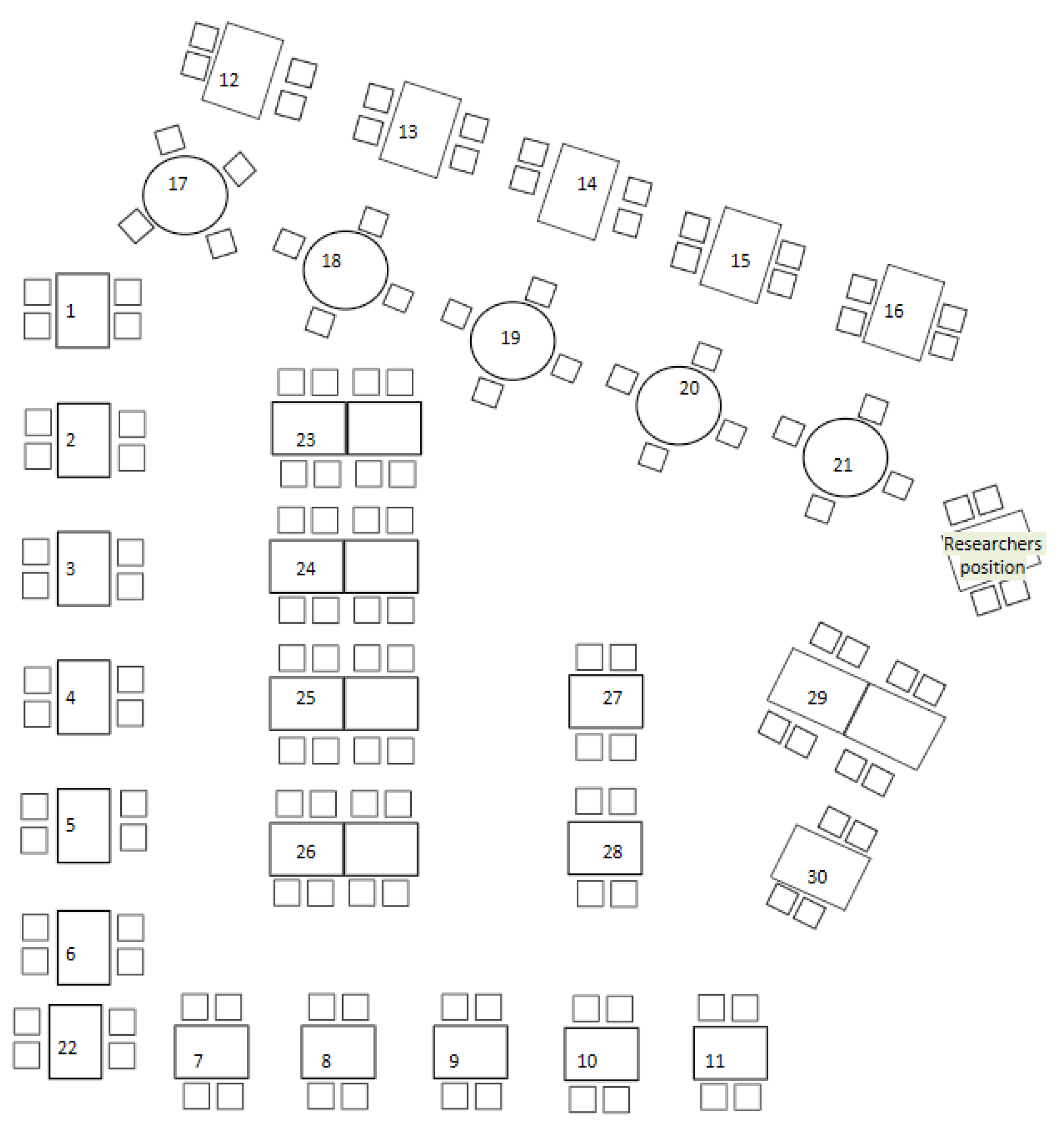
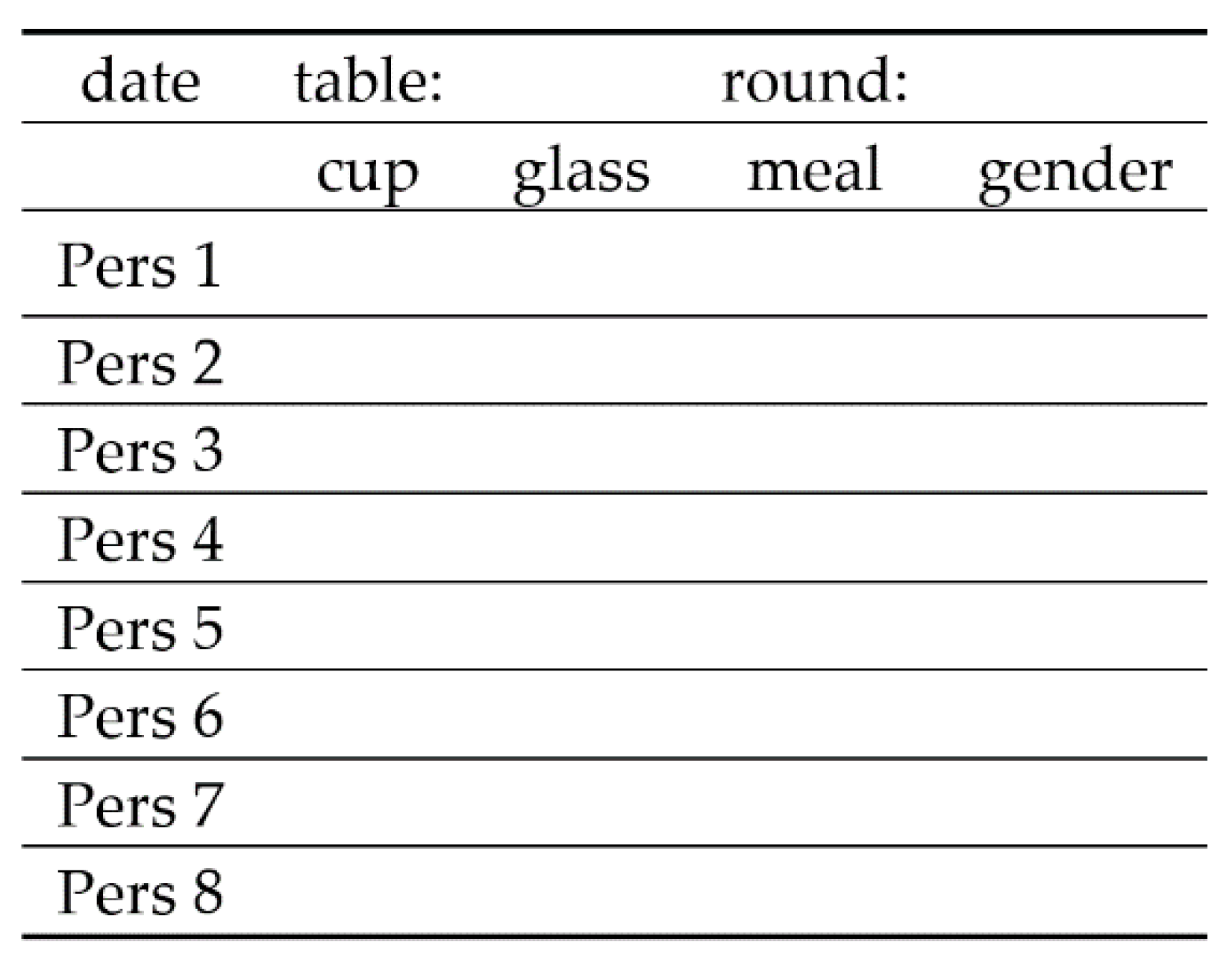
References
- Alfredsson, E.; Bengtsson, M.; Brown, H.S.; Isenhour, C.; Lorek, S.; Stevis, D.; Vergragt, P. Why Achieving the Paris agreement requires reduced overall consumption and production. Sustain. Sci. Pract. Policy 2018, 14, 1–5. [Google Scholar] [CrossRef]
- Maniates, M. Sustainable consumption—Three paradoxes. Gaia 2014, 23, 201–208. [Google Scholar] [CrossRef]
- Soneryd, L.; Uggla, Y. Green governmentality and responsibilization: New forms of governance and responses to ‘consumer responsibility’. Env. Polit. 2015, 24, 913–931. [Google Scholar] [CrossRef]
- Thaler, R.H.; Sunstein, C.R. Nudge: Improving Decisions About Health, Wealth, and Happiness; Penguin Books: New York, NY, USA, 2009. [Google Scholar]
- United Nations Environmental Programme. Emissions Gap Report; UNEP: Nairobi, Kenya, 2019. [Google Scholar]
- Akenji, L. Consumer scapegoatism and limits to green consumerism. J. Clean. Prod. 2014, 63, 13–23. [Google Scholar] [CrossRef]
- Boström, M. The social life of mass and excess consumption. Environ. Sociol. 2020, 1–11. [Google Scholar] [CrossRef]
- Isenhour, C. On Conflicted Swedish consumers, the effort to stop shopping and neoliberal environmental governance. J. Consum. Behav. 2010, 9, 454–469. [Google Scholar] [CrossRef]
- Isenhour, C. Building Sustainable Societies: A Swedish case study on the limits of reflexive modernization. Am. Ethnol. 2010, 37, 511–525. [Google Scholar] [CrossRef]
- Kennedy, E.H.; Hauslik, D. The practice of green consumption. In Environment and Society: Concepts and Challenges; Boström, M., Davidson, D.J., Eds.; Palgrave Macmillan: Chatham, UK, 2018; pp. 187–206. ISBN 9783319764153. [Google Scholar]
- Shove, E.; Pantzar, M.; Watson, M. The Dynamics of Social Practice: Everyday Life and How it Changes; Sage Publications: London, UK, 2012; ISBN 9780857020437. [Google Scholar]
- Sijtsema, S.J.; Onwezen, M.C.; Reinders, M.J.; Dagevos, H.; Partanen, A.; Meeusen, M. Consumer perception of bio-based products—An exploratory study in 5 European countries. NJAS Wagening. J. Life Sci. 2016, 77, 61–69. [Google Scholar] [CrossRef]
- Schor, J.B. True Wealth; Penguin Books: New York, NY, USA, 2011. [Google Scholar]
- Garnett, E.E.; Balmford, A.; Sandbrook, C.; Pilling, M.A.; Marteau, T.M. Impact of increasing vegetarian availability on meal selection and sales in cafeterias. Proc. Natl. Acad. Sci. USA 2019, 116, 20923–20929. [Google Scholar] [CrossRef]
- Kallbekken, S.; Sælen, H. “Nudging” hotel guests to reduce food waste as a win-win environmental measure. Econ. Lett. 2013, 119, 325–327. [Google Scholar] [CrossRef]
- Nielsen, A.S.E.; Sand, H.; Sørensen, P.; Knutsson, M.; Martinsson, P.; Persson, E.; Wollbrant, C. Nudging and Pro-environmental Behaviour; Nordic Council of Ministers: Copenhagen, Denmark, 2016; ISBN 978-92-893-4755-6. [Google Scholar]
- Oostindjer, M.; Aschemann-Witzel, J.; Wang, Q.; Skuland, S.E.; Egelandsdal, B.; Amdam, G.V.; Schjøll, A.; Pachucki, M.C.; Rozin, P.; Stein, J.; et al. Are school meals a viable and sustainable tool to improve the healthiness and sustainability of children’s diet and food consumption? A cross-national comparative perspective. Crit. Rev. Food Sci. Nutr. 2017, 57, 3942–3958. [Google Scholar] [CrossRef] [PubMed]
- Loschelder, D.D.; Siepelmeyer, H.; Fischer, D.; Rubel, J.A. Dynamic norms drive sustainable consumption: Norm-based nudging helps café customers to avoid disposable to-go-cups. J. Econ. Psychol. 2019, 75, 102146. [Google Scholar] [CrossRef]
- Lehner, M.; Mont, O.; Heiskanen, E. Nudging—A promising tool for sustainable consumption behaviour? J. Clean. Prod. 2016, 134, 166–177. [Google Scholar] [CrossRef]
- Lieberoth, A.; Holm Jensen, N.; Bredahl, T. Selective psychological effects of nudging, gamification and rational information in converting commuters from cars to buses: A controlled field experiment. Transp. Res. Part F Traffic Psychol. Behav. 2018, 55, 246–261. [Google Scholar] [CrossRef]
- Nørnberg, T.R.; Houlby, L.; Skov, L.R.; Peréz-Cueto, F.J.A. Choice architecture interventions for increased vegetable intake and behaviour change in a school setting: A systematic review. Perspect. Public Health 2016, 136, 132–142. [Google Scholar] [CrossRef] [PubMed]
- Blumer, H. Symbolic Interactionism. Perspective and Method; University of California Press: Los Angeles, CA, USA, 1969. [Google Scholar]
- Cialdini, R.B.; Goldstein, N.J. Social influence: Compliance and conformity. Annu. Rev. Psychol. 2004, 55, 591–621. [Google Scholar] [CrossRef]
- Bourdieu, P. Die Feinen Unterschiede: Kritik der Gesellschaftlichen Urteilskraft; Suhrkamp Verlag: Frankfurt am Main, Germany, 1982. [Google Scholar]
- Bogueva, D.; Marinova, D.; Raphaely, T. Reducing meat consumption: The case for social marketing. Asia Pacific J. Mark. Logist. 2017, 29, 477–500. [Google Scholar] [CrossRef]
- Banjeree, A.V. A simple model of herd behavior. Q. J. Econ. 1992, 107, 797–817. [Google Scholar] [CrossRef]
- Bond, R.M.; Fariss, C.J.; Jones, J.J.; Kramer, A.D.I.; Marlow, C.; Settle, J.E.; Fowler, J.H. A 61-million-person experiment in social influence and political mobilization. Nature 2012, 489, 295–298. [Google Scholar] [CrossRef]
- Centola, D.; Becker, J.; Brackbill, D.; Baronchelli, A. Tipping points in social convention. Science 2018, 360, 1116–1119. [Google Scholar] [CrossRef]
- Dimant, E. On Peer Effects: Behavioral Contagion of (Un)Ethical Behavior and the Role of Social Identity; MPRA Paper, University Library of Munich: Munich, Germany, 2016. [Google Scholar]
- Fieldhouse, E.; Cutts, D. The companion effect: Household and local context and the turnout of young people. J. Polit. 2012, 74, 856–869. [Google Scholar] [CrossRef]
- Le Bon, G. Die Psychologie der Massen; (1911); Nikol Verlagsgesellschaft: Hamburg, Germany, 2009. [Google Scholar]
- Ikeda, K.; Boase, J. Multiple discussion networks and their consequence for political participation. Commun. Res. 2011, 38, 660–683. [Google Scholar] [CrossRef]
- Kuran, T. Private Truths, Public Lies: The Social Consequences of Preference Falsification; Harvard University Press: Cambridge, MA, USA, 1997. [Google Scholar]
- Lim, C. Mobilizing on the margin: How does interpersonal recruitment affect citizen participation in politics? Soc. Sci. Res. 2010, 39, 341–355. [Google Scholar] [CrossRef]
- McClurg, S.D. Social networks and political participation: The role of social interaction in explaining political participation. Polit. Res. Q. 2003, 56, 449–464. [Google Scholar] [CrossRef]
- Nickerson, D.W. Is voting contagious? Evidence from two field experiments. Am. Polit. Sci. Rev. 2008, 102, 49–57. [Google Scholar] [CrossRef]
- Partheymüller, J.; Schmitt-Beck, R. A “Social logic” of demobilization: The influence of political discussants on electoral participation at the 2009 German federal election. J. Elect. Public Opin. Parties 2012, 22, 457–478. [Google Scholar] [CrossRef]
- Schmitt-Beck, R.; Mackenrodt, C. Social networks and mass media as mobilizers and demobilizers: A study of turnout at a German local election. Elect. Stud. 2010, 29, 392–404. [Google Scholar] [CrossRef]
- Hoffer, E. True Believer. Thoughts on the Nature of Mass Movements; Harpercollins: New York, NY, USA, 2010. [Google Scholar]
- Zollo, L.; Yoon, S.; Rialti, R.; Ciappei, C. Ethical consumption and consumers’ decision making: The role of moral intuition. Manag. Decis. 2018, 56, 692–710. [Google Scholar] [CrossRef]
- Welsch, H.; Kühling, J. Determinants of pro-environmental consumption: The role of reference groups and routine behavior. Ecol. Econ. 2009, 69, 166–176. [Google Scholar] [CrossRef]
- Schor, J.B. Prices and quantities: Unsustainable consumption and the global economy. Ecol. Econ. 2005, 55, 309–320. [Google Scholar] [CrossRef]
- Kahneman, D. Maps of bounded rationality: Psychology for behavioral economics. Am. Econ. Rev. 2003, 93, 1449–1475. [Google Scholar] [CrossRef]
- Kahneman, D. Thinking, Fast and Slow; Penguin Books: London, UK/New York, NY, USA, 2011. [Google Scholar]
- Tversky, A.; Kahneman, D. Judgment under uncertainty: Heuristics and biases. Science 1974, 185, 1124–1131. [Google Scholar] [CrossRef] [PubMed]
- Tversky, A.; Kahneman, D. The framing of decisions and the psychology of choice. Science 1981, 211, 453–458. [Google Scholar] [CrossRef] [PubMed]
- Simon, H.A. A behavioral model of rational choice. Q. J. Econ. 1955, 69. [Google Scholar] [CrossRef]
- Simon, H. A rational decision-making in business organizations. Am. Econ. Rev. 1978, 493–513. [Google Scholar] [CrossRef]
- Wansink, B.; Sobal, J. Mindless eating: The 200 daily food decisions we overlook. Environ. Behav. 2007, 39, 106–123. [Google Scholar] [CrossRef]
- Etzioni, A.; Piore, M.J.; Streeck, W. Behavioural economics. Socio-Economic Rev. 2010, 8, 377–397. [Google Scholar] [CrossRef]
- Bettman, J.R.; Luce, M.F.; Payne, J.W. Consumer decision making: A choice goals approach. In Handbook of Consumer Psychology; Haugtvedt, C.P., Herr, P.M., Kardes, F.R., Eds.; Psychology Press: New York, NY, USA, 2008; pp. 589–610. ISBN 0-8058-5603-X (Hardcover). 978-0-8058-5603-3 (Hardcover). [Google Scholar]
- Fishbach, A.; Dhar, R. Dynamics of goal-based choice: Towards understanding on how goals commit versus liberate choice. In Handbook of Consumer Psychology; Haugtvedt, C.P., Herr, P.M., Kardes, F.R., Eds.; Psychology Press: New York, NY, USA, 2008; pp. 611–638. ISBN 9781410618993_24. [Google Scholar]
- Joireman, J.; Barnes Truelove, H.; Duell, B. Effect of outdoor temperature, heat primes and anchoring on belief in global warming. J. Environ. Psychol. 2010, 30, 358–367. [Google Scholar] [CrossRef]
- Liu, P.J.; Wisdom, J.; Roberto, C.A.; Liu, L.J.; Ubel, P.A. Using behavioral economics to design more effective food policies to address obesity. Appl. Econ. Perspect. Policy 2014, 36, 6–24. [Google Scholar] [CrossRef]
- Wyer, R.S. The role of knowledge accessibility in cognition and behavior: Implications for consumer information processing. In Handbook of Consumer Psychology; Haugtvedt, C.P., Herr, P.M., Kardes, F.R., Eds.; Psychology Press: New York, NY, USA, 2008; pp. 31–76. [Google Scholar]
- Johnson, E.J.; Goldstein, D. Do defaults save lives? Science 2003, 302, 1338–1339. [Google Scholar] [CrossRef]
- Cioffi, C.E.; Levitsky, D.A.; Pacanowski, C.R.; Bertz, F. A nudge in a healthy direction. The effect of nutrition labels on food purchasing behaviors in university dining facilities. Appetite 2015, 92, 7–14. [Google Scholar] [CrossRef] [PubMed]
- Miller, G.F.; Gupta, S.; Kropp, J.D.; Grogan, K.A.; Mathews, A. The effects of pre-ordering and behavioral nudges on national school lunch program participants’ food item selection. J. Econ. Psychol. 2016, 55. [Google Scholar] [CrossRef]
- Rozin, P.; Scott, S.; Dingley, M.; Urbanek, J.K.; Jiang, H.; Kaltenbach, M. Nudge to nobesity I: Minor changes in accessibility decrease food intake. Judgm. Decis. Mak. 2011, 6, 323–332. [Google Scholar]
- Reese, G.; Loew, K.; Steffgen, G. A towel less: Social norms enhance pro-environmental behavior in hotels. J. Soc. Psychol. 2014, 154, 97–100. [Google Scholar] [CrossRef]
- Costa, D.L.; Kahn, M.E. Energy conservation “nudges” and environmentalist ideology: Evidence from a randomized residential electricity field experiment. J. Eur. Econ. Assoc. 2013, 11, 680–702. [Google Scholar] [CrossRef]
- Sparkman, G.; Walton, G.M. Dynamic norms promote sustainable behavior, even if it is counternormative. Psychol. Sci. 2017, 28, 1663–1674. [Google Scholar] [CrossRef]
- Sherif, M. Group Conflict and Co-operation: Their Social Psychology; Routledge and Kegan Paul: London, UK, 1967. [Google Scholar]
- Centola, D. How Behaviour Spreads. The Science of Complex. Contagions; Princeton University Press: Princeton, NJ, USA; Oxford, UK, 2018. [Google Scholar]
- Coviello, L.; Sohn, Y.; Kramer, A.D.I.; Marlow, C.; Franceschetti, M.; Christakis, N.A.; Fowler, J.H. Detecting emotional contagion in massive social networks. PLoS ONE 2014, 9, 1–6. [Google Scholar] [CrossRef]
- Davies, K.; Tropp, L.R.; Aron, A.; Pettigrew, T.F.; Wright, S.C. Cross-group friendships and intergroup attitudes A meta-analytic review. Personal. Soc. Psychol. Rev. 2011, 15, 332–351. [Google Scholar] [CrossRef]
- Dimant, E. Contagion of Pro- and Anti- Social Behavior Among Peers and the Role of Social Proximity; CeDEx Discussion Paper Series: Nottingham, UK, 2018. [Google Scholar]
- Guillory, J.E.; Hancock, J.T.; Verma, I.M. Experimental evidence of massivescale emotional contagion through social networks. Proc. Natl. Acad. Sci. USA 2014, 111, 10779. [Google Scholar] [CrossRef]
- Janssen, M.A.; Jager, W. Fashions, habits and changing preferences: Simulation of psychological factors affecting market dynamics. J. Econ. Psychol. 2001, 22, 745–772. [Google Scholar] [CrossRef]
- Otto, I.M.; Donges, J.F.; Bhowmik, A.; Cremades, R.; Lucht, W.; Rockström, J.; Allerberger, F.; Doe, S.; Hewitt, R.; Lenferna, A.; et al. Social tipping dynamics for stabilizing earth’s climate by 2050. Proc. Natl. Acad. Sci. USA 2019. [Google Scholar] [CrossRef] [PubMed]
- Parkinson, B.; Simons, G. Affecting others: Social appraisal and emotion contagion in everyday decision making. Pers. Soc. Psychol. Bull. 2009, 35, 1071–1084. [Google Scholar] [CrossRef] [PubMed]
- Campbell, D.E. Social networks and political participation. Annu. Rev. Polit. Sci. 2013, 16, 33–48. [Google Scholar] [CrossRef]
- Mutz, D.C. Cross-cutting social networks: Testing democratic theory in practice. Am. Polit. Sci. Rev. 2002, 96, 111–126. [Google Scholar] [CrossRef]
- Mutz, D.C. The consequences of cross-cutting networks for political participation. Am. J. Pol. Sci. 2002, 46, 838. [Google Scholar] [CrossRef]
- Schlozman, K.L.; Verba, S.; Brady, H.E. The Unheavenly Chorus: Unequal Political Voice and the Broken Promise of American Democracy; Princeton University Press: Princeton, NJ, USA, 2012. [Google Scholar]
- Higgs, S.; Thomas, J. Social influences on eating. Curr. Opin. Behav. Sci. 2016, 9, 1–6. [Google Scholar] [CrossRef]
- Robinson, E.; Blissett, J.; Higgs, S. Social influences on eating: Implications for nutritional interventions. Nutr. Res. Rev. 2013, 26, 166–176. [Google Scholar] [CrossRef]
- Salvy, S.J.; de la Haye, K.; Bowker, J.C.; Hermans, R.C.J. Influence of peers and friends on children’s and adolescents’ eating and activity behaviors. Physiol. Behav. 2012, 106, 369–378. [Google Scholar] [CrossRef]
- Sharps, M.; Higgs, S.; Blissett, J.; Nouwen, A.; Chechlacz, M.; Allen, H.A.; Robinson, E. Examining evidence for behavioural mimicry of parental eating by adolescent females. An observational study. Appetite 2015, 89, 56–61. [Google Scholar] [CrossRef][Green Version]
- Al Ramiah, A.; Schmid, K.; Hewstone, M.; Floe, C. Why are all the white (Asian) kids sitting together in the cafeteria? Resegregation and the role of intergroup attributions and norms. Br. J. Soc. Psychol. 2015, 54, 100–124. [Google Scholar] [CrossRef]
- Stockholms läns landsting. Klimatsmarta Val av Dryckesbägare. Available online: https://www.sll.se/globalassets/6.-om-landstinget/hallbarhet/miljo/klimatsmarta-val-dryckesbagare.pdf (accessed on 12 December 2020).
- IVL Svenska Miljöinstitutet. Vilken Kaffemugg är Bäst för Miljön? Available online: https://via.tt.se/data/attachments/00973/3b39f428-e8a3-451c-90c9-0db2e43e1637.pdf (accessed on 12 December 2020).
- Engell, D.; Kramer, M.; Malafi, T.; Salomon, M.; Lesher, L. Effects of effort and social modeling on drinking in humans. Appetite 1996, 26, 129–138. [Google Scholar] [CrossRef] [PubMed]
- Meiselman, H.L.; Hedderley, D.; Staddon, S.L.; Pierson, B.J.; Symonds, C.R. Effect of effort on meal selection and meal acceptability in a student cafeteria. Appetite 1994. [Google Scholar] [CrossRef] [PubMed]
- Oliver, A. Nudging, shoving, and budging: Behavioural economic-informed policy. Public Adm. 2015, 93, 700–714. [Google Scholar] [CrossRef]
- Schultz, P.W.; Nolan, J.M.; Cialdini, R.B.; Goldstein, N.J.; Griskevicius, V. The constructive, destructive, and reconstructive power of social norms: Reprise. Perspect. Psychol. Sci. 2018, 13, 249–254. [Google Scholar] [CrossRef]
- Sunstein, C.R.; Reisch, L.A. Green by default. Kyklos 2013, 66, 398–402. [Google Scholar] [CrossRef]
- Goldstein, N.J.; Cialdini, R.B. Using social norms as a lever of social influence. In The Science of Social Influence: Advances and Future Progress, Pratkanis, A.R., Ed.; Psychology Press: Hove, UK, 2011; ISBN 9780203818565. [Google Scholar]
- Farrow, K.; Grolleau, G.; Ibanez, L. Social norms and pro-environmental behavior: A review of the evidence. Ecol. Econ. 2017, 140, 1–13. [Google Scholar] [CrossRef]
- Cialdini, R.B.; Reno, R.R.; Kallgren, C.A. A focus theory of normative conduct. Recycling the concept of norms to reduce littering in public places. J. Pers. Soc. Psychol. 1990, 58, 1015–1026. [Google Scholar] [CrossRef]
- Barr, S. Factors Influencing environmental attitudes and behaviors: A U.K. case study of household waste management. Environ. Behav. 2007, 39, 435–473. [Google Scholar] [CrossRef]
- Barr, S.; Gilg, A.W.; Ford, N.J. Differences between household waste reduction, reuse and recycling behaviour: A study of reported behaviours, intentions and explanatory variables. Waste Manag. 2001, 4, 69–82. [Google Scholar]
- Göckeritz, S.; Schultz, P.W.; Rendon, T.; Cialdini, R.B.; Goldstein, N.J.; Griskevicius, V. Descriptive normative beliefs and conservation behavior: The moderating roles of personal involvement and injunctive normative beliefs. Eur. J. Soc. Psychol. 2010, 40, 514–523. [Google Scholar] [CrossRef]
- Goldsmith, E.B.; Goldsmith, R.E. Social influence and sustainability in households. Int. J. Consum. Stud. 2011, 35, 117–121. [Google Scholar] [CrossRef]
- Nyborg, K.; Anderies, J.M.; Dannenberg, A.; Lindahl, T.; Schill, C.; Schlüter, M.; Adger, W.N.; Arrow, K.J.; Barrett, S.; Carpenter, S.; et al. Social norms as solutions. Science 2016, 354, 42–43. [Google Scholar] [CrossRef] [PubMed]
- Schultz, P.W. Changing behavior with normative feedback interventions: A field experiment on curbside recycling. Basic Appl. Soc. Psych. 1999, 21, 25–36. [Google Scholar] [CrossRef]
- De la Haye, K.; Robins, G.; Mohr, P.; Wilson, C. Adolescents’ intake of junk food: Processes and mechanisms driving consumption similarities among friends. J. Res. Adolesc. 2013, 23, 524–536. [Google Scholar] [CrossRef]
- Larson, N.; Story, M. A Review of environmental influences on food choices. Ann. Behav. Med. 2009, 38, 56–73. [Google Scholar] [CrossRef]
- Benabou, R.; Tirole, J. Incentives and prosocial behavior. Am. Econ. Rev. 2005, 96, 1652–1678. [Google Scholar] [CrossRef]
- March, J.G.; Olsen, J.P. Oxford handbooks online. The logic of appropriateness. In The Oxford Handbook of Political Science; Goodin, R.E., Ed.; Oxford University Press: Oxford, UK, 2011; pp. 478–479. ISBN 9780199604456. [Google Scholar]
- Hausknost, D.; Hammond, M. Beyond the environmental state? The political prospects of a sustainability transformation. Env. Polit. 2020, 29, 1–16. [Google Scholar] [CrossRef]
- Hobson, K. Competing discourses of sustainable consumption: Does the “rationalisation of lifestyles” make sense? Env. Polit. 2002, 11, 95–120. [Google Scholar] [CrossRef]
- Geller, E.S. It takes more than information to save energy. Am. Psychol. 1992, 814–815. [Google Scholar] [CrossRef]
- Warde, A. What sort of a practice is eating. In Sustainable Practices: Social Theory and Climate Change; Shove, E., Spurling, N., Eds.; Routledge: London, UK; New York, NY, USA, 2013; pp. 17–30. ISBN 9780203071052. [Google Scholar]
- Melnyk, V.; van Herpen, E.; Fischer, A.R.H.; van Trijp, H.C.M. To think or not to think: The effect of cognitive deliberation on the influence of injunctive versus descriptive social norms. Psychol. Mark. 2011, 28, 709–729. [Google Scholar] [CrossRef]
- Bennett, L.W. The personalization of politics: Political identity, social media, and changing patterns of participation. Ann. Am. Acad. Pol. Soc. Sci. 2012, 644, 20–39. [Google Scholar] [CrossRef]
- Huddy, L. From social to political identity: A critical examination of social identity theory. Polit. Psychol. 2001, 22, 127–156. [Google Scholar] [CrossRef]
- Oakes, P. Psychological groups and political psychology: A response to Huddy’s “critical examination of social identity theory”. Polit. Psychol. 2002, 23, 809–824. [Google Scholar] [CrossRef]
- Turner, J.C.; Oakes, P.J. The significance of the social identity concept for social psychology with reference to individualism, interactionism and social influence. Br. J. Soc. Psychol. 1986, 25, 237–252. [Google Scholar] [CrossRef]
- Brewer, M.B. The importance of being we: Human nature and intergroup relations. Am. Psychol. 2007, 62, 726–738. [Google Scholar] [CrossRef] [PubMed]
- Brewer, M.B. Intergroup Relations, 2nd ed.; Open University Press: Buckingham, UK, 2003. [Google Scholar]
- Ariely, D.; Norton, M.I. Conceptual consumption. Annu. Rev. Psychol. 2009, 60, 475–499. [Google Scholar] [CrossRef] [PubMed]
- Mann, H.; Garcia-Rada, X.; Houser, D.; Ariely, D. Everybody else is doing it: Exploring social transmission of lying behavior. PLoS ONE 2014, 9, 11–14. [Google Scholar] [CrossRef] [PubMed]
- Sirgy, M.J. Self-concept in consumer behavior: A critical review. J. Consum. Res. 1982, 9, 287–300. [Google Scholar] [CrossRef]
- Brewer, M.B.; Caporael, L.R. An evolutionary perspective on social identity: Revisiting groups. In Evolution and Social Psychology; Schaller, M., Simpson, J.A., Douglas, T.K., Eds.; Psychology Press: New York, NY, USA, 2006; pp. 143–162. ISBN 9780123983367. [Google Scholar]
- Earls, M. Herd. How to Change Mass Behaviour By Harnessing Our True Nature, 2nd ed.; Wiley and Sons: Chichester, UK, 2009. [Google Scholar]
- Hogg, M.A.; Abrams, D.; Otten, S.; Hinkle, S. The social identity perspective. Intergroup relations, self-conception, and small groups. Small Gr. Res. 2004, 35, 246–276. [Google Scholar] [CrossRef]
- Luhtanen, R.; Crocker, J. A collective self-esteem scale: Self-evaluation of one’s social identity. Personal. Soc. Psychol. Bull. 1992, 18, 302–318. [Google Scholar] [CrossRef]
- Turner, J.C. Social categorization and self-concept: A social cognitive theory of group behavior. In Advances in Group Process: Theory and Research, Lawler, E.J., Ed.; JAI Press: Greenwich, CT, USA, 1985; pp. 77–122. [Google Scholar]
- Robinson, E.; Tobias, T.; Shaw, L.; Freeman, E.; Higgs, S. Social matching of food intake and the need for social acceptance. Appetite 2011, 56, 747–752. [Google Scholar] [CrossRef] [PubMed]
- Spanos, S.; Vartanian, L.R.; Herman, C.P.; Polivy, J. Failure to report social influences on food intake: Lack of awareness or motivated denial? Heal. Psychol. 2014, 33, 1487–1494. [Google Scholar] [CrossRef] [PubMed]
- Buton, F.; Lemercier, C.; Mariot, N. The household effect on electoral participation. A contextual analysis of voter signatures from a French polling station (1982–2007). Elect. Stud. 2012, 31, 434–447. [Google Scholar] [CrossRef]
- Fieldhouse, E.; Cutts, D. Shared partisanship, household norms and turnout: Testing a relational theory of electoral participation. Br. J. Polit. Sci. 2016, 1–17. [Google Scholar] [CrossRef]
- Foos, F.; de Rooij, E.A. All in the family: Partisan disagreement and electoral mobilization in intimate networks—A spillover experiment. Am. J. Pol. Sci. 2017, 61, 289–304. [Google Scholar] [CrossRef]
- Straits, B.C. The social context of voter turnout. Public Opin. Q. 1990, 54, 64–73. [Google Scholar] [CrossRef]
- Kravetz, L.D. Strange Contagion; Harper Wave: New York, NY, USA, 2017. [Google Scholar]
- Centola, D. The spread of behavior in an online social network experiment. Science 2010, 329, 1194–1197. [Google Scholar] [CrossRef]
- Centola, D. An experimental study of homophily in the adoption of health behavior. Science 2011, 334, 1269–1272. [Google Scholar] [CrossRef]
- Schmidt, K. Practice must speak for itself. Remarks on the concept of practice. Navigationen 2015, 99–115. [Google Scholar]
- Halkier, B. Political food consumerism between mundane routines and organizational alliance-building. In The Oxford Handbook of Political Consumerism; Boström, M., Micheletti, M., Oosterveer, P., Eds.; Oxford University Press: Oxford, UK, 2019; pp. 275–292. ISBN 9780190629038. [Google Scholar]
- Reckwitz, A. Toward a theory of social practices: A development in culturalist theorizing. Eur. J. Soc. Theory 2002, 5, 243–263. [Google Scholar] [CrossRef]
- Reckwitz, A. Das Hybride Subjekt. Eine Theorie der Subjektkulturen von der Bürgerlichen Moderne yur Postmoderne; Velbrück Wissenschaft: Weilerswist-Metternich, Germany, 2006. [Google Scholar]
- Schatzki, T.R. Social Practices. A Wittgensteinian Approach to Human Acticity and the Social; Cambridge University Press: Cambridge, UK, 2008; ISBN 1111111111. [Google Scholar]
- Boström, M.; Klintman, M. Can We rely on ‘climate-friendly’ consumption? J. Consum. Cult. 2019, 19, 359–378. [Google Scholar] [CrossRef]
- Marshall, M. Hållbarhet till Middag. En Etnologisk Studie om hur Miljövänligt Ätande Praktiseras i Vardagslivet; Brutus Östlings Bokförlag Symposion: Höör, Sweden, 2016. [Google Scholar]
- Oosterveer, P.; Spaargaren, G.; Kloppenburg, S. Political consumerism and the social-practice perspective. In The Oxford Handbook of Political Consumerism; Boström, M., Micheletti, M., Oosterveer, P., Eds.; Oxford University Press: Oxford, UK, 2019; pp. 134–156. ISBN 9780190629038. [Google Scholar]
- Spaargaren, G.; Martens, S. Globalisation and the role of citizen-consumers in environmental politics. In Proceedings of the Political Consumerism: Its Motivations, Power, and Conditions in the Nordic Countries and Elsewhere; Boström, M., Føllesdal, A., Klintman, M., Micheletti, M., Sørensen, M.P., Eds.; Nordic Council of Ministers: Copenhagen, Denmark, 2005; pp. 25–58. [Google Scholar]
- Ouellette, M. You’ve always got time: (Disposable) Coffee cup litter as discursive regime(s). Verb 2007, 5, 1–12. [Google Scholar]
- Schifferstein, H.N.J. The drinking experience: Cup or content? Food Qual. Prefer. 2009, 20, 268–276. [Google Scholar] [CrossRef]
- Warde, A. Theories of Practice as an Approach to Consumption; Centre for Research on Innovation and Competition and Department of Sociology, University of Manchester: Manchester, UK, 2004. [Google Scholar]
- Müller, H.-P. Die einbettung des handelns. Pierre Bourdieus praxeologie. Berl. J. Soziol. 2002, 12, 157–171. [Google Scholar] [CrossRef]
- Chartrand, T.L.; Bargh, J.A. The chameleon effect: The perception-behavior link and social interaction. J. Pers. Soc. Psychol. 1999, 76, 893–910. [Google Scholar] [CrossRef] [PubMed]
- Lakin, J.L.; Chartrand, T.L. Using nonconscious behavioral mimicry to create affiliation and rapport. Psychol. Sci. 2003, 14, 334–339. [Google Scholar] [CrossRef] [PubMed]
- Lakin, J.L.; Jefferis, V.E.; Cheng, C.M.; Chartrand, T.L. The chameleon effect as social glue: Evidence for the evolutionary significance of nonconscious mimicry. J. Nonverbal Behav. 2003, 27, 145–162. [Google Scholar] [CrossRef]
- Aral, S.; Muchnik, L.; Sundararajan, A. Distinguishing influence-based contagion from homophily-driven diffusion in dynamic networks. Proc. Natl. Acad. Sci. USA 2009, 106, 21544–21549. [Google Scholar] [CrossRef]
- Shalizi, C.R.; Thomas, A.C. Homophily and contagion are generically confounded in observational social network studies. Soc. Methods Res. 2011, 40, 211–239. [Google Scholar] [CrossRef]
- John, P.; Smith, G.; Stoker, G. Nudge nudge, think think: Two strategies for changing civic behaviour. Polit. Q. 2009, 80, 361–370. [Google Scholar] [CrossRef]
- Banerjee, A.V.; Chandrasekhar, A.; Duflo, E.; Jackson, M.O. Gossip: Identifying Central Individuals in a Social Network; NBER Working Paper, Stanford Center for International Development: Stanford, CA, USA, 2014. [Google Scholar]
- Banjeree, A.V.; Chandrasekhar, A.G.; Duflo, E.; Jackson, M.O. Using Gossips to Spread Information: Theory and Evidence from two Randomized Controlled Trials; MIT Department of Economics Working Paper, Stanford University: Stanford, CA, USA, 2018. [Google Scholar]
- Paluck, E.L.; Shepherd, H.S. The salience of social referents: A field experiment on collective norms and harassment behavior in a school social network. J. Pers. Soc. Psychol. 2012, 103, 899–915. [Google Scholar] [CrossRef] [PubMed]
- Paluck, E.L.; Shepherd, H.; Aronow, P.M. Correction: Changing climates of conflict: A social network experiment in 56 schools. Proc. Natl. Acad. Sci. USA 2016, 113, 566–571. [Google Scholar] [CrossRef] [PubMed]
- Shepherd, H.; Paluck, E.L. Stopping the drama: Gendered influence in a network field experiment. Soc. Psychol. Q. 2015, 78, 173–193. [Google Scholar] [CrossRef]
- Gladwell, M. The Tipping Point: How Little Things Can. Make a Big Difference; Back Bay Books: New York, NY, USA, 2002. [Google Scholar]
- Doyle, C.; Sreenivasan, S.; Szymanski, B.K.; Korniss, G. Social consensus and tipping points with opinion inertia. Phys. A Stat. Mech. Appl. 2016, 443, 316–323. [Google Scholar] [CrossRef]
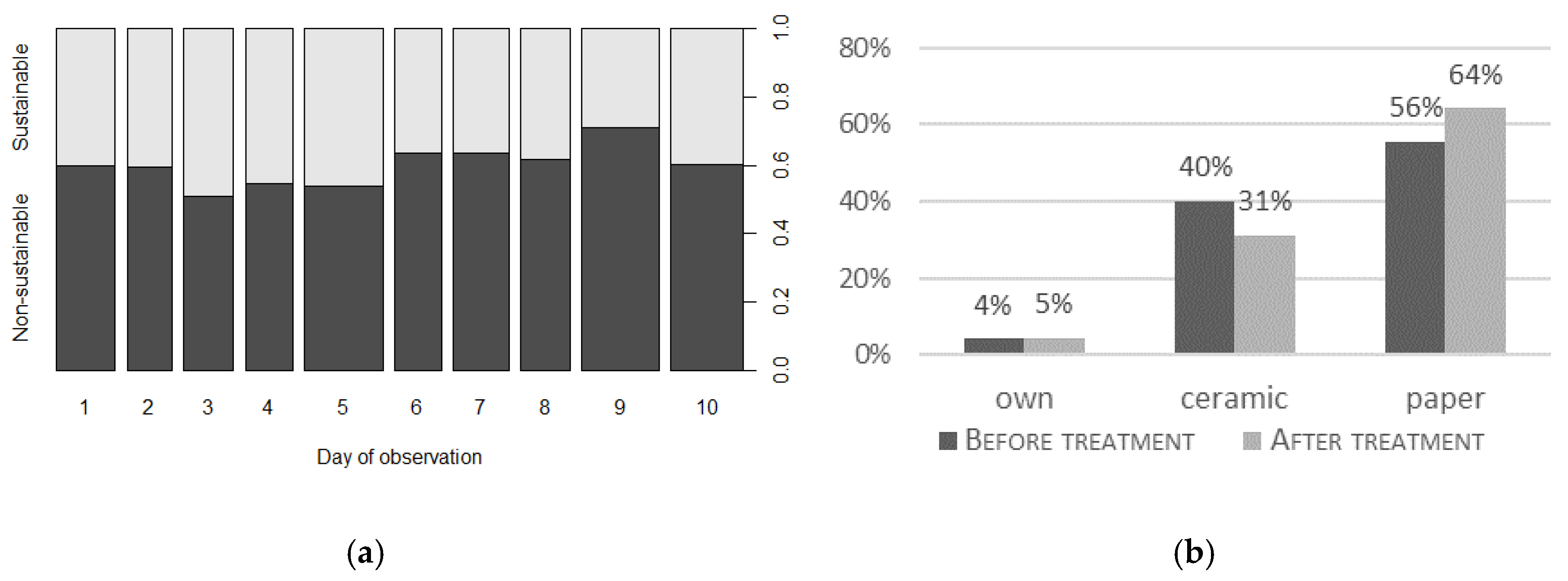
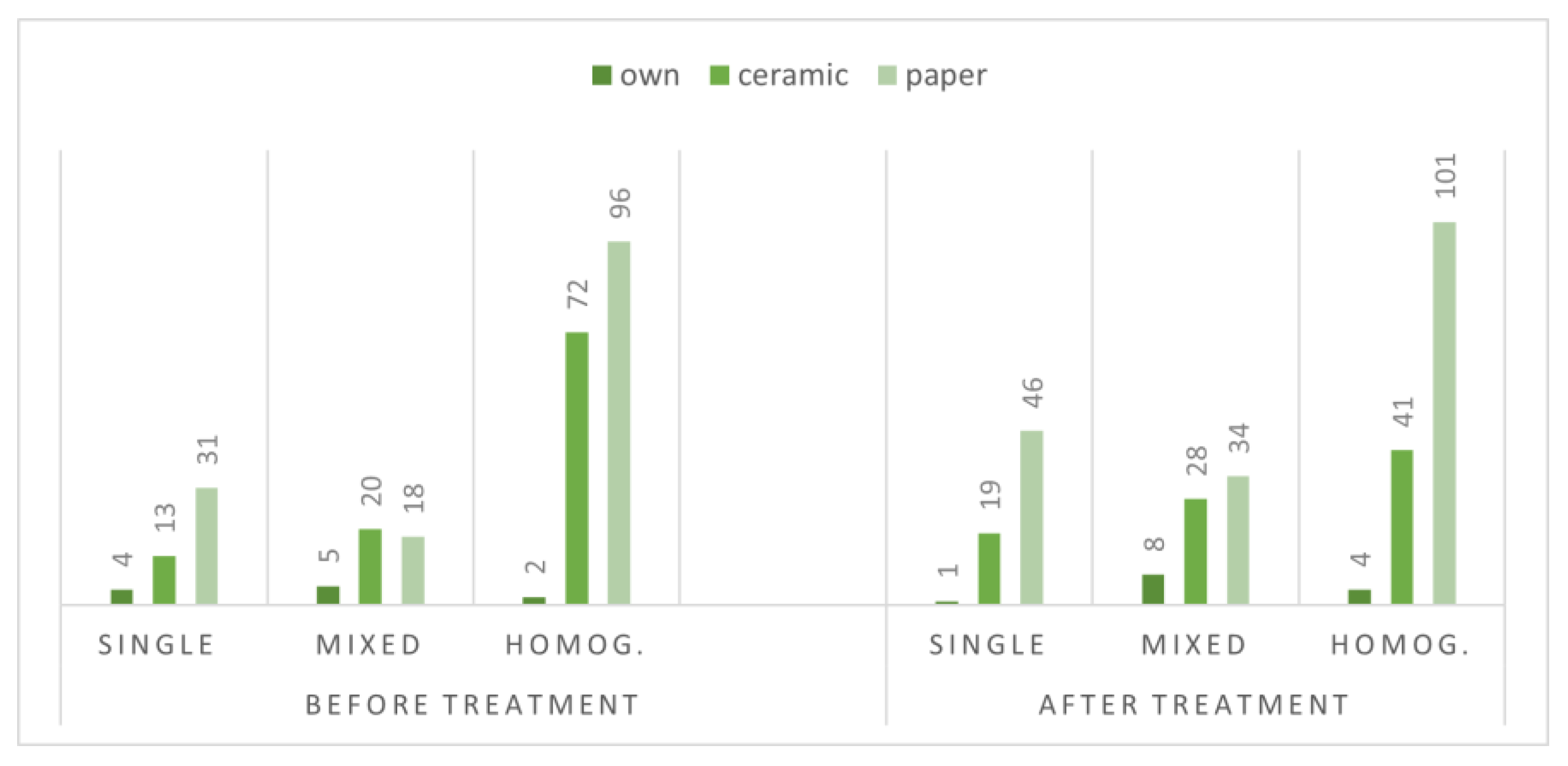
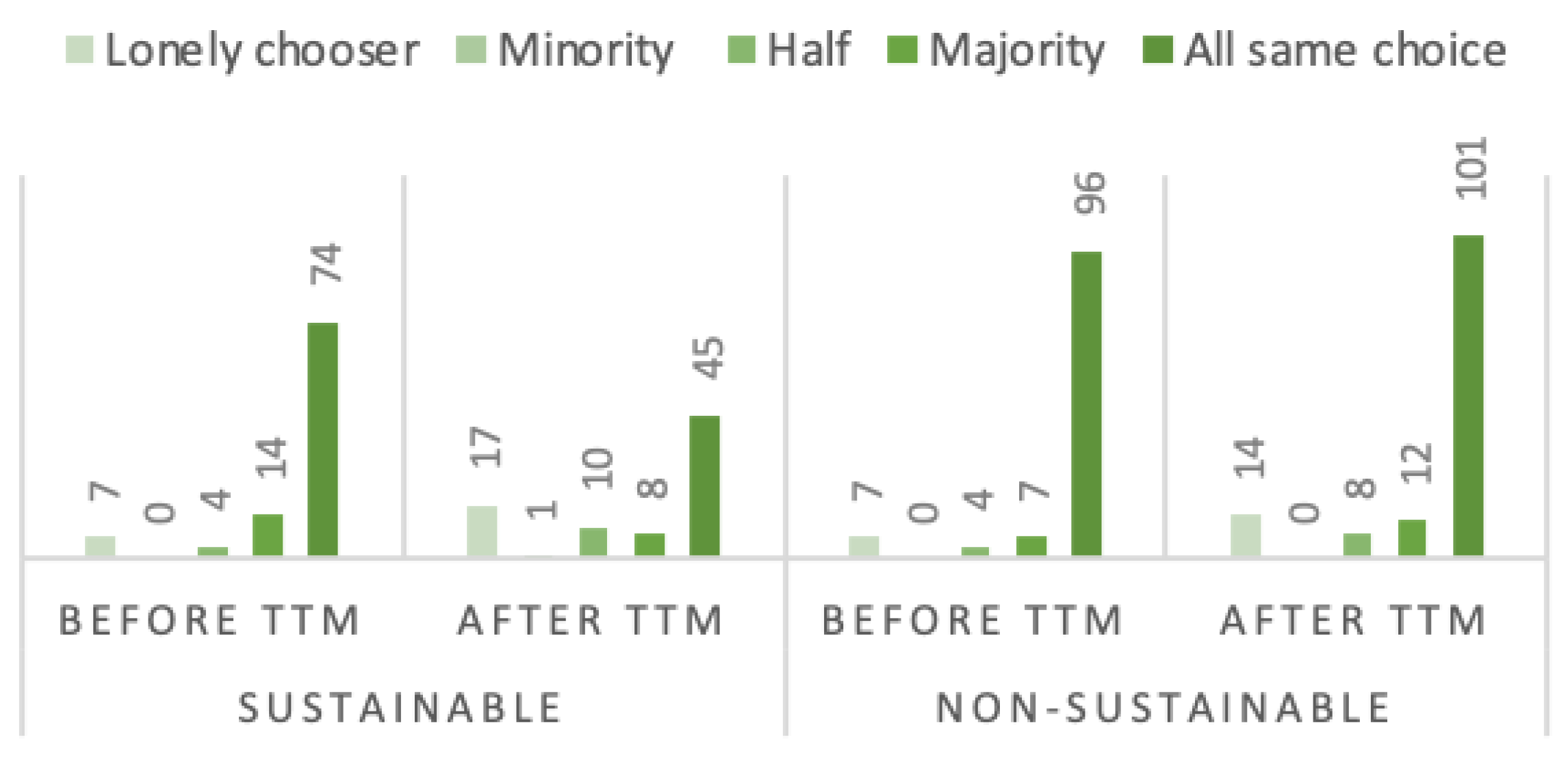
| Group Level Data | Individual Level Data |
|---|---|
| Date | Gender |
| Round (before/after treatment) | Cup |
| Table number | Glass |
| Size of group (no. of persons) | Meal |
Publisher’s Note: MDPI stays neutral with regard to jurisdictional claims in published maps and institutional affiliations. |
© 2020 by the author. Licensee MDPI, Basel, Switzerland. This article is an open access article distributed under the terms and conditions of the Creative Commons Attribution (CC BY) license (http://creativecommons.org/licenses/by/4.0/).
Share and Cite
Zorell, C.V. Nudges, Norms, or Just Contagion? A Theory on Influences on the Practice of (Non-)Sustainable Behavior. Sustainability 2020, 12, 10418. https://doi.org/10.3390/su122410418
Zorell CV. Nudges, Norms, or Just Contagion? A Theory on Influences on the Practice of (Non-)Sustainable Behavior. Sustainability. 2020; 12(24):10418. https://doi.org/10.3390/su122410418
Chicago/Turabian StyleZorell, Carolin V. 2020. "Nudges, Norms, or Just Contagion? A Theory on Influences on the Practice of (Non-)Sustainable Behavior" Sustainability 12, no. 24: 10418. https://doi.org/10.3390/su122410418
APA StyleZorell, C. V. (2020). Nudges, Norms, or Just Contagion? A Theory on Influences on the Practice of (Non-)Sustainable Behavior. Sustainability, 12(24), 10418. https://doi.org/10.3390/su122410418





